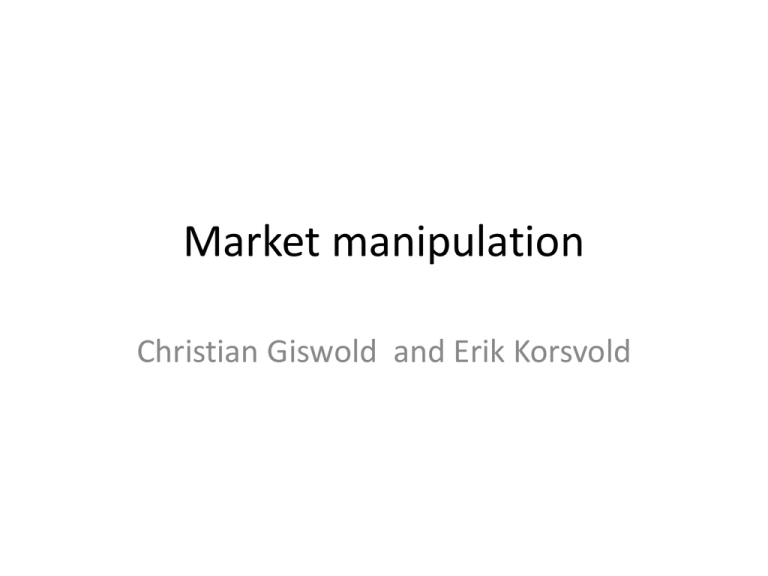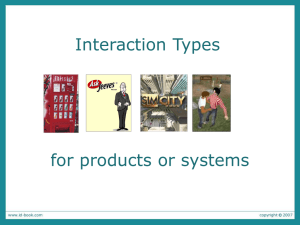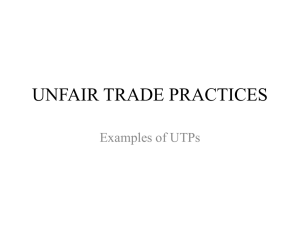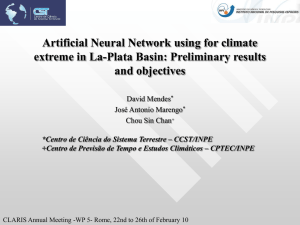A13-WMSEG-07-02_market manipulation
advertisement

Market manipulation Christian Giswold and Erik Korsvold Definition of Market Manipulation ‘market manipulation’ means: (a) entering into any transaction or issuing any order to trade in wholesale energy products which: (i) gives, or is likely to give, false or misleading signals as to the supply of, demand for, or price of wholesale energy products; (ii) secures or attempts to secure, by a person, or persons acting in collaboration, the price of one or several wholesale energy products at an artificial level, unless the person who entered into the transaction or issued the order to trade establishes that his reasons for doing so are legitimate and that that transaction or order to trade conforms to accepted market practices on the wholesale energy market concerned; or (iii) employs or attempts to employ a fictitious device or any other form of deception or contrivance which gives, or is likely to give, false or misleading signals regarding the supply of, demand for, or price of wholesale energy products; General • Effect-based regulation – No actual effect is required; no trades need to be made – Sufficient that an effect is ”likely” • The effect is measured on the market – The unsound (mis)perception of individual participants is irrelevant • The intent of the manipulator is not relevant (except for attempt) – Not visible to the market – Very difficult to prove and/or verify • It is not required that the market participant in question has deliberately acted in order to give misleading signals as to the supply of, demand for or price of a listed product. As long as the market participant should have been aware that his actions were of such nature, his actions constitute a breach of the prohibition against market manipulation. Gives, or is likely to give • Gives – must be evaluated ex post (actual result of the action is relevant) • Is likely to give – must be evaluated based on the information that was available prior to the signal being sent • Based on the above, information can give false or misleading signals without being likely to do so, and it can be likely to give false or misleading signals without actually doing so. • In comparison, the defintion of inside information only refers to «is likely to give», and not «gives» False or misleading signal • Sufficient that the information is either false or misleading, but it has to be a signal • What if the information is false, but it is so insignificant that no market participant will use the information in trading? • Possible interpretations: – Signal: information of such a nature that a rational participant would be likely to use the information in his or her decision of whether or not to enter into one or more transactions, e.g. best bid/ask orders, new order price levels, transactions, etc. – False or misleading: give other market participants an inaccurate or untruthful picture as to the supply of, demand for or price, e.g. placing of a bid at the same time as the real market interest in fact is to sell Secure • Distinction between (i) and (ii): whereas alternative (i) only requires a potential effect caused by “manipulative signals”, alternative (ii) requires that an actual effect of securing [..] at an artificial level is achieved. • It is not sufficient that the action contributes to or results in an artificial price level. It must «secure» the artificial price level. • Must the price be secured at a specific price level, or is it sufficient that it is secured that the price level is artificial? • Will a dominant position be required in order to secure a an atificial price level? – No, even a single order may secure the price and low liquidity may also make it possible without a dominant position Artificial price level • The Market Abuse Directive is referring to «abnormal or artificial», while REMIT refers only to «artificial». Abnormal must be considered to deviate from normal, while artificial must only deviate from what would have been the case if the abusive actions were not undertaken • No requirement to the size of the deviation • Is it possible to «secure» the price at an artificial level without entering into a transaction? – Yes, even a single order may secure the price, e.g. an order at the end of the trading day may secure the closing price. Definition of «attempt to manipulate the market» “entering into any transaction, issuing any order to trade or taking any other action relating to a wholesale energy product with the intention of:” • Taking any other action is not mentioned in the definition of market manipulation, thus if an intention is proven, also “any other action” may be a breach of REMIT • Thus, your intentions are relevant, not your actions or their consequences. The only requirement is that there is an action. Article 5 – Prohibition of Market Manipulation «Any engagement in, or attempt to engage in, market manipulation on wholesale energy markets shall be prohibited» • Is it possible to do something that falls under the definition of Market Manipulation without engaging in manipulation? • Strictly speakig, the wording of Article 5 does not provide a prohibition of «attempted market manipulation». It may therefore be unclear whether it is prohibited to: – Attempt to do what is described in the definition of «market manipulation», or – Do what is described in the definition of «attempted market manipulation», or – Both of the above • Example: Is it prohibited to attempt to disseminate information through the media which is likely to give false or misleading signals? Summary • According to the wording of REMIT, if an action, order or transaction sends a false signal, it can be market manipulation even if it was: – – – – not intentional not caused by any negligence not likely to send a false or misleading signal not likely to, and did not, have a negative impact on the market (i.e. no one acted or was likely to act on the false signal) • Necessary with guidance to ensure a common EU-approach











